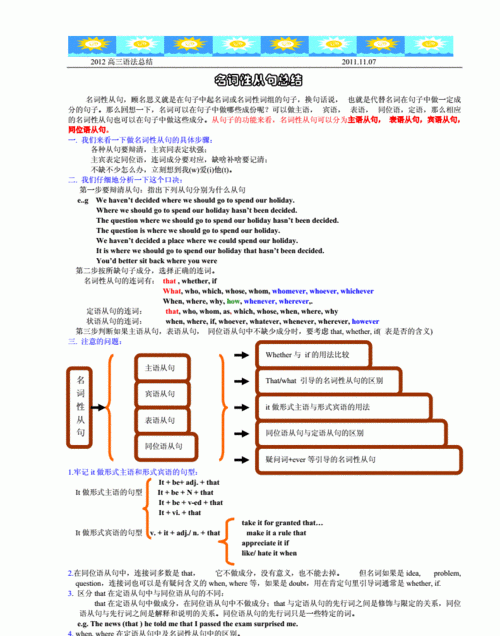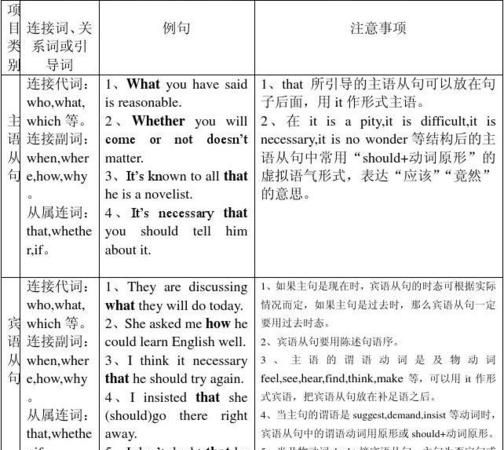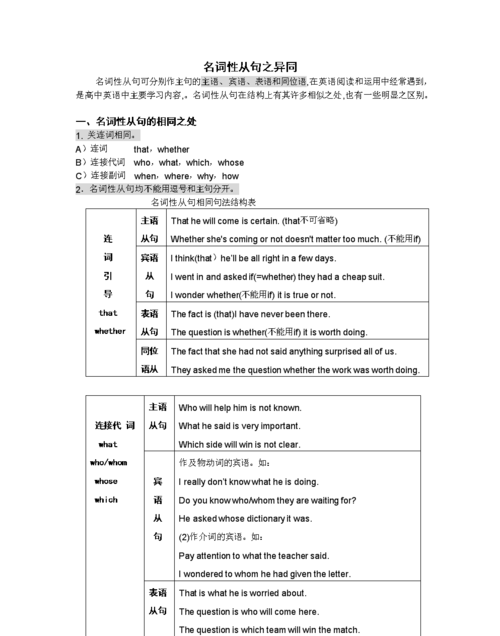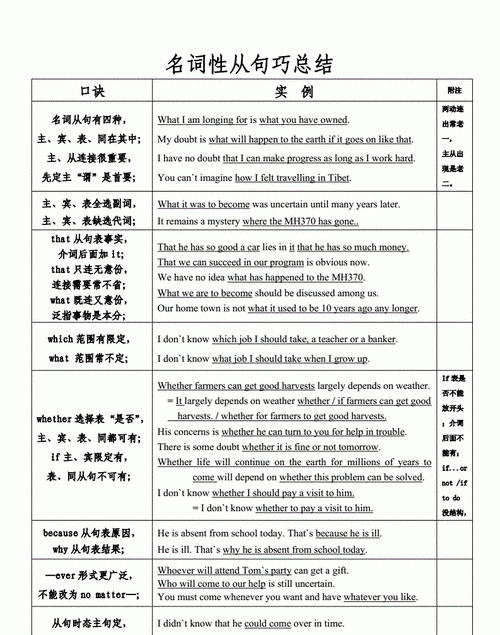本文目录
高中英语名词性从句讲解视频
其实名词性从句也不难,只要仔细研究,很容易掌握的。以下为详解,满意请采纳哈~~~~
一、概说
名词性从句,即指性质相当于名词的从句,它包括主语从句、宾语从句、表语从句和同位语从句。从高考的考查的实际情况来看,名词性从句考得最多的是宾语从句,其次是主语从句,再次是表语从句,而同位语从句则很少考查。
二、名词性从句的一般引导词
1.
连接词
that
只起连接作用,没有任何意思,也不充当句子成分,在宾语从句中可省略,但引导其他名词性从句时通常不省略。如:
I
hope
(that)
you
enjoy
your
holiday.
希望你假期过得好。
That
he
likes
you
is
very
obvious.
很显然他喜欢你。
2.
连接词
whether
也不充当句子成分,但有自己的意思,表示“是否”;引导宾语从句时,可换成
if,但引导其他名词性从句时不能换成
if。
He
asked
whether
[if]
I
would
show
him
the
way.
他问我是否可以给他带路。
Whether
it
will
do
us
harm
remains
to
be
seen.
是否对我们有害还要看一看。(引导主语从句,不能用
if
代替
whether)
3.
连接代词
who(m),
whose,
which,
what
等,均有各自的意义,在从句中作主语、宾语、定语等。如:
That’s
why
she
wanted
to
leave.
这就是她想离开的原因。
When
we
arrive
doesn't
matter.
什么时候到没有关系。
Tell
me
which
one
you
like
best.
告诉我你最喜欢哪一个。
4.
连接副词
when,
where,
why,
how
等,也各自有自己的意义,在从句中作状语。如:
The
question
is
how
we
should
carry
out
the
plan.
问题是怎样执行这个计划。
When
she’ll
be
back
depends
much
on
the
weather.
她什么时候回来在很大程度上要看天气。
Why
he
did
it
will
remain
a
puzzle
forever.
他为什么这样做将永远是一个谜。
三、名词性从句的重要引导词
1.
what
用于引导名词性从句是一个十分重要的引导词,它可引导主语从句、宾语从句和表语从句,但不用于引导同位语从句。它引导的名词性从句有两个意思是:一是表示“什么”,带有疑问意味;二是表示“…所…的”,相当于一个先行词后接一个关系代词。如:
I
don’t
know
what
you
want.
我不知道你想要什么。
I
don’t
know
what
you
want
is
this.
我不知道你所想要的是这个。
2.
what
引导名词性从句时可用作限定词,其后修饰名词。如:
I
gave
him
what
books
I
had.
我把我所有的书都给他了。
He
gave
me
what
money
he
had
about
him.
他把身边带有的钱全给了我。
注:what
后的名词可以是复数名词或不可数名词,但通常不能是单数可数名词,并且后接不可数名词时,有时可有little修饰,两者的区别是:what+不可数名词=所有的都,what
little+不可数名词=虽少但全部。如:
What
friends
she
has
are
out
of
the
country.
她有的那些朋友全在国外。
We
gave
him
what
(little)
help
we
could.
我们给了他我们力所能及的帮助。
3.
whoever,
whatever,
whichever
等也可引导名词性从句,其意分别为“所…的一切事或东西”、“任何…的人”、““…的任可人或物”等。如:
Whoever
wants
the
book
may
have
it.
任何人要这书都可拿去。
I’ll
do
whatever
I
can
to
help
him.
我们将尽我们所能来挽救他。
Buy
whichever
is
cheapest.
买最便宜的。
注意以下受汉语意思影响而弄错的句子:
任何人来都欢迎。
误:Who
comes
will
be
welcome.
/
Anyone
comes
will
be
welcome.
正:Whoever
comes
will
be
welcome.
/
Anyone
who
comes
will
be
welcome.
另外,它们也可引导让步状语从句,其意为“无论…”、“不管…”,其意相当于
no
matter
who
[what,
which]。如:
Whatever
happens,
you
must
be
calm.
不管发生什么情况,你都必须镇静。(whatever
=
no
matter
what)
He
won't
eat
you,
whoever
he
is.
不管他是谁,他也不能把你吃掉。(whoever
=
no
matter
who)
注:whoever
既用作主格也用作宾语;作宾语时不宜用
whomever,因为在现代英语中
whomever
这个已几乎废弃不用。
4.
why
与
because
的用法区别。两者均可引导表语从句,但前者强调结果,后者强调的原因。如:
I
had
a
cold.
That’s
why
I
didn't
come.
我感冒了,因此我没来。
I
didn’t
come.
That’s
because
I
had
a
cold.
我没有来,那是因为我感冒了。
五、名词性从句的语序
名词性从句的词序与陈述句语序相同,尤其注意那些由连接代词who(m),
whose,
which,
what
和连接副词
when,
where,
why
等引导的名词性从句,不要受它们在特殊疑问句中用法的影响而误用疑问句词序。如:
Why
was
she
crying?
她为什么在哭?
I
don’t
know
why
he
was
crying.
我不知道她为什么哭。
六、名词性从句的时态问题
1.
当主句的谓语动词是过去式时,宾语从句若不是一个客观事实或真理,其谓语动词也必须用某种过去时态。如:
She
said
that
she
didn't
want
to
know.
她说她不想知道。
I
asked
her
whether
she
would
agree.
我问她是否会同意。
2.
when,
if
这两个词既可引导名词性从句,也可引导状语从句。当它们引导名词性从句且表示将来意义时,要直接使用将来时态;但当它们引导状语从句且表示将来意义时,则必须用一般现在时表示将来意义。如:
I
don’t
know
when
he
will
come,
but
when
he
comes,
I’ll
call
you.
我不知道他什么时候,但当他来的时候,我会打电话给你。
句中第一个when
引导的是宾语从句,故用将来时态表示将来意义;第二个when
引导的是时间状语从句,故用一般现在时表示将来意义。

名词性从句的基础知识
以下有四点:
1. 宾语从句
(1) that引导的宾语从句
I know that he is friendly and hospitable.
我知道他很友好而且好客。
(由连接代词引导)
Almost all economists agree that nations gain by trading with one another .
几乎所有的经济学家都承认,各国在相互的贸易中受益。
注:① they told us once again that the situation was serious .
他告诉我们说形势是严重的。
(亦可以说They told us that once again that the situation was serious).
(他们告诉我们说形势又严重了)但是两句中的that皆不可以省去,否则会产生歧义。
② He said he couldn’t tell you right away and that you wouldn’t understand.
他说他不能马上告诉你,你是不会理解的。
(said 之后可以省去that,但第二个that 不可省去。)
③ That he ever said such a thing I simply don’t believe.
我简直不相信他曾说过这样的话。(that 从句置于句首是,that 不可省去)
④ We decided ,in view of his special circumstances, that we would admit him for a probationary period.
鉴于他的特殊情况,我们决定给他一段试用期
(2) 连接代词、连接副词以及连接词whether/if引导的宾语从句
History innguists stdudy how languages evolve over time
历史语言学家研究语言是如何随着时间的推移而发展的。(由连接副词引导)
Do you know when we shall have a meeting?
你知道我们什么时候开会吗?(由连接副词引导)
I asked him if he sure what he is doing.
我问他是否确信知道自己在做什么?(连接词if以及连接代词引导)
The teacher asked me whether or not I finished my work?
老师问我是否完成了作业。(连接词wheter引导)
(3) 名词性关系代词what,whatever,whichever,whoever引导的宾语从句
He gave whoever asked for it a copy of his latest paper.
不论谁要他都将他最近写的论文给他一份。
The President is determined to resist what he regards as blackmail by the terrorists. 总统决心抵制他所认为的恐怖分子的敲诈。
You can call me whatever you like.
你叫我什么都行。
You may choose which appeals to you.
你对哪个感兴趣就可以选哪个。
Use which method you prefer.
你喜欢哪个方法就用哪个方法。
2. 介词宾语从句(1) that引导的介词宾语从句
that引导的介词宾语从句仅限于用在except,but,notwithstanding等少数介词后。
His account is correct except that some details are omitted.
除了有些细节未提到外,他的叙述是正确的。
He would have helped us but that he was short of money at the time.
要不是他那时缺钱,他一定会帮助我们的。(2) 连接代词和连接副词引导的介词宾语从句
I have no definite information yet as to which route he will take.
对他将走哪条路线,我们还没有确切的情报。
I know nothing about the matter except what you told me.
除你告诉我的情况以外,对此事我一无所知。
但要注意:引导介词宾语从句的whether不能换作if。(3) 名词性关系代词what, whatever, whichever, whoever引导的介词宾语从句
The boy was interested in whatever he saw here
那孩子对在那里看到的任何事物都感兴趣。
The first prize should go to whoever writes best.
头等奖应颁给最优秀的作者。
3. 表语从句
(1) that引导的表语从句
My idea is that you should make good use of your time.
我的建议是你该好好利用你的时间。
The reason Tom failed in the exam was that he didn’t work hard.
汤姆考试没过的原因是学习不努力。
(2) 连接代词和连接副词以及连接词whether引导的表语从句
The question is whether we can finish our work by tomorrow evening.
问题在于我们能不能在明天晚上以前完成这项工作。
(引导表语从句的whether不能换作if)
That is why she had a day –off yesterday .
那就是她昨天请假的原因。
(3) as if等引导的表语从句
It looks as if it is going to rain.
看起来天要下雨。
I felt as though my head were splitting.
我觉得头仿佛要裂开似的。
注:除了as if/as though之外,从属连词as 和 because 也可以引导表语从句。
Things are not always as they seem to be.事情并不总是如其表象。
It may be because he is too busy .这可能是因为他太年轻了。
It is because he doesn’t know hers.这是由于他不认识她。
4. 同位语从句
(1) that引导的同位语从句
We are very excited at the news that our Chinese athletes won many gold medals.
听到我们中国运动员赢得了许多金牌的消息我们非常激动。
A new idea occurred to him that it could be done in a very simple way.
他想出一个新主意:这件事可以用一种很简单的方法完成。
(2) 连接代词和连接副词引导的同位语从句
同位语从句通常由that引导,但随着与其同位的名词的不同,也可由whether, when, which, who, how, what,why等引出。如:
The question , whether we need it , has not yet been considered
我们是否需要它,这个问题还没有被考虑。
I have no idea when she will be back.
我不知道她何时回来。
I have no idea which dictionary is hers.
我不知道哪本词典是她的。
(3) 同位语从句的位置
同位语从句有时不是紧跟在有关的名词后面,而是被其他的词隔开了。如:
We’ve just heard a warming on the radio that a typehoo may be on its way .
我们刚从广播里听到一则气象警报,说有一股台风即将到来。
The question came up at the meeting whether weo had enough meoney for our research.
会上提出了我们的研究经费是否够的问题。

名词性从句的用法
名词性从句就是句子担任名词性的成分,如主语,宾语,表语,同位语。它包括主语从句、宾语从句、表语从句和同位语从句。
1. 主语从句
(1)What he said is true.
(2)When they will arrive is not known yet.
(3)That he succeeded in doing the experiment was encouraging.
(4)Whether he will accept the invitation remains a secret.
(5)It is important that we should learn English well.
2. 宾语从句
(1)I don't know if he has done the work.
(2)Did he say that he liked football ?
(3)They expected that they would be given another chance.
(4)The girl told me that she had longed to visit China.
3. 表语从句
(1)The question is whether we have enough time to do the experiment again.
(2)His greatest wish was that someday he would become a general.
(3)His suggestion was that we should discuss the plan carefully.
(4)My question is when they can finish the work.
4. 同位语从句
(1)You have no idea how eager they are to know the result.
(2)He made a suggestion that the work should be given to him.
(3)Have you heard the news that Premire Wen visited our school last Friday ?
(4)The fact that he got full mark in the composition made his parents very happy.
名词性从句主要从以下几点把握:
1. 语序。从句一定要是陈述语序。如:
(1)These pictures will show you what the village looks like now.
(2)How many guests will be invited isn’t decided yet.
2. 时态。宾语从句的时态需要和主句进行协调。如主句是过去时,从句要用相应的过去时。
(1)He told me that he had seen the film.
(2)They said they would spend their holiday in Hainan.
(3)Father said he was carrying out an important project.
(4)Did you know where the accident took place ?
3. 连词。引导名词性从句的连词分为三种:连词 that, whether, if (在主语、表语、同位语从句中用 whether 不用if );连接代词 who, whom, whose, which, what 等; 连接副词 when, where, how, why 等。
(1)Whether the team has won the game is not announced yet. (主语从句)
(2)How many people will take part in the competition will be known soon. (主语从句)
(3)My idea is that we should spend our holidays by the seaside. (表语从句)
(4)My question is how they finished the work in such a short time. (表语从句)
(5)Many people are shocked at the news that there are so many SARS cases in Beijing. (同位语从句)
(6)His suggestion that we should discuss the plan again has been received. (同位语从句)
(7)I didn’t know if they had seen the film. (宾语从句)
(8)We haven’t decided when we’ll start the project. (宾语从句)
4. 形式主语和形式宾语的应用:
当主语从句比较长,主句比较短时,通常用形式主语it,而把从句放在后面,如:
(1)It is said that they have succeeded in working out the problem.
(2)It was important that we should make the plan carefully.
(3)It remains a secret how the animals came to live in the sea.
当宾语从句后面有补语的时候,我们也需要用形式宾语it, 而将宾语从句放在补语之后,如:
(1)I found it very difficult that one learns several languages at the same time.
(2)He thinks it necessary that we should be given more time practising oral English.
(3)He made it clear that he would leave the office soon.
5. 虚拟语气在名词性从句中的运用: 在demand, insist, suggest, command, require, request, order, propose 等表示命令, 要求,请求,建议等意义的动词后,宾语从句要用虚拟语气,动词形式为: should do , should 可省,直接用动词原形,如:
(1)He suggested that we (should) go outing this weekend.
(2)The Emperor ordered that the clothes (should) be made for him at once.
(3)He insisted that we (should) stay for lunch.
这种虚拟语气也可以运用在其他的名词性从句中,从句内容不变, 如:
(1)It was suggested that we should go outing this weekend. (主语从句)
(2)He made a suggestion that we should go outing this weekend. (同位语从句)
(3)His suggestion was that we should go outing this weekend. (表语从句)
6. 定语从句与同位语从句的区别:
定语从句修饰前面的名词,而同位语从句说明前面名词的内容,引导定语从句的that在从句中担任名词性成分,而同位语从句中的 that 不担任任何句子成分.如:
(1)Have you heard the news that was broadcast this morning ? (定语从句)
(2)Have you heard the news that we defeated the Japanese football team ?(同位语从句)
(3)What do you think of the suggestion that was put forward by Lily ?(定语从句)
(4)What do you think of the suggestion that we should speak only English in class ?(同位语从句)
7. 几个容易混淆的连词:
A. whether 和 if:whether可以用在所有的名词性从句中;而if 只能用于宾语从句,另外,如果有介词的话,仍然用whether。
(1)Whether the advice will be accepted is not known. (主语从句,不可以用if)
(2)I have no idea whether he will come. (同位语从句,不可以用if.)
(3)The problem is whether we have enough time to do it again. (表语从句,不可以用if .)
(4)He didn’t tell me whether (if ) he would accept my invitation. (宾语从句,两者都可以)
(5)Everything depends on whether we have enough manpower. (介词之后不用if )
B. what 和 that:that 在名词性从句中不担任句子成分;what 在名词性从句中做主语,宾语,表语等,通常译为”所...的”,如:
(1)What we have done is very important. (what 做宾语)
(2)That they have done the work is good news. (that 无句子成分)
(3)I believe what he said. (what 做宾语)
(4)I believe that he told truth. (that 无句子成分)

高中英语名词性从句总结
名词性从句的功能相当于名词词组, 它在复合句中能担任主语、宾语、表语、同位语、介词宾语等,因此根据它在句中不同的语法功能,名词性从句又可分别称为主语从句、宾语从句、表语从句和同位语从句。一、引导名词性从句的连接词分类 引导名词性从句的连接词可分为三类: 连词(5个):that (宾语从句或表语从句中that有时可以省略) whether,if (均表示“是否”表明从句内容的不确定性) as if ,as though (均表示“好像”,“似乎”) 以上在从句中均不充当任何成分 连接代词(9个):what, whatever, who, whoever, whom, whomever, whose, which, whichever 连接副词(7个):when, where, how, why, whenever, wherever, however 不可省略的连词: 1. 介词后的连词 2. 引导主语从句和同位语从句的连词不可省略。 That she was chosen made us very happy. We heard the news that our team had won. 比较 whether与if 均为"是否"的意思。 但在下列情况下,只可用whether: 1. whether引导主语从句并在句首 2. 引导表语从句 3. whether从句作介词宾语 4. 常与 "or not" 连用;if 则不可。 5. 引导同位语从句 Whether he will come is not clear. 大部分连接词引导的主语从句都可以置于句末,用 it充当形式主语。 It is not important who will go. It is still unknown which team will win the match. 二. 主语从句 作句子主语的从句叫主语从句。主语从句通常由从属连词that,whether,if,as if和because等连接代词what,who,which,whatever,whoever,whom等以及连接副词how,when,where,why等词引导。that在句中无词义,只起连接作用;连接代词和连接副词在句中既保留自己的疑问含义、又起连接作用,在从句中充当从句的成分。because引导表语从句。注:whom、who指人,what指物,whatever,whoever表示泛指意义。例如: What he wants to tell us is not clear. 他要跟我们说什么,还不清楚。 Who will win the match is still unknown. 谁能赢得这场比赛还不得而知。 It is known to us how he became a writer. 我们都知道他是如何成为一名作家的。 Where the English evening will be held has not yet been announced. 英语晚会将在哪里举行,还没有宣布。 有时为避免句子头重脚轻,常用形式主语it代替主语从句作形式主语放于句首,而把主语从句置于句末。主语从句后的谓语动词一般用单数形式。常用句型如下: (1) It + be + 名词 + that从句 (2)It + be + 形容词 + that从句 (3)It + be + 动词的过去分词 + that从句 (4)It + 不及物动词 + that 从句 另注意在主语从句中用来表示惊奇、不相信、惋惜、理应如此等语气时,谓语动词要用虚拟语气“(should) +do”,常用的句型有: It is necessary (important, natural, strange, etc.) that … It is suggested (requested, proposed, desired, etc.) that… 三、宾语从句 名词从句用作宾语的从句叫宾语从句。引导宾语从句的关联词与引导主语从句表语从句的关联词大致一样,在句中可以作谓语动词或介词及非谓语动词的宾语。 1. 由连接词that引导的宾语从句 由连接词that引导宾语从句时,that在句中不担任任何成分,在口语或非正式的文体中常被省去,但如从句是并列句时,第二个分句前的that不可省。例如: He has told me that he will go to Shanghai tomorrow. 他已经告诉我他明天要去上海。 We must never think (that) we are good in everything while others are good in nothing. 我们决不能认为自己什么都好,别人什么都不好。 注意:在demand、order、suggest、decide、insist, desire, request, command, doubt等表示要求、命令、建议、决定等意义的动词后,宾语从句常用“(should)+ 动词原形”。例如: I insist that she (should) do her work alone. 我坚持要她自己工作。 The commander ordered that troops (should) set off at once. 司令员命令部队马上出发。 2. 用who,whom, which, whose, what, when, where, why, how, whoever, whatever, whichever等关联词引导的宾语从句相当于特殊疑问句,应注意句子语序要用陈述语序。例如: I want to know what he has told you. 我想知道他告诉了你什么。 She always thinks of how she can work well. 她总是在想怎样能把工作做好。 She will give whoever needs help a warm support. 凡需要帮助的人,她都会给予热情的支持。 3. 用whether或if引导的宾语从句,其主语和谓语的顺序也不能颠倒,仍保持陈述句语序。此外,whether与if 在作“是否”的意思讲时在下列情况下一般只能用whether,不用if: a. 引导主语从句并在句首时;b. 引导表语从句时;c . 引导从句作介词宾语时;d. 从句后有“or not”时;e. 后接动词不定式时。例如: Whether there is life on the moon is an interesting question. 月球上有没有生命是个有趣的问题。 Everything depends on whether we have enough money. 一切要看我们是否有足够的钱。 I wonder whether he will come or not. 我想知道他来还是不来。 Can you tell me whether to go or to stay? 你能否告诉我是去还是留? 4. 注意宾语从句中的时态呼应,当主句动词是现在时,从句根据自身的句子情况,而使用 不同时态。例如: I know (that) he studies English every day. (从句用一般现在时) I know (that) he studied English last term. (从句用一般过去时) I know (that) he will study English next year. (从句用一般将来时) I know (that) he has studied English since 1998. (从句用现在完成时) 当主句动词是过去时态(could, would除外),从句则要用相应的过去时态,如一般过去时,过去进行时,过去将来时等;当从句表示的是客观真理,科学原理,自然现象,则从句仍用现在时态。例如: The teacher told us that Tom had left us for America. 5. think, believe, imagine, suppose等等动词引起的否定性宾语从句中,要把上述主句中的动词变为否定式。即将从句中的否定形式移到主句中。例如: We don’t think you are here. 我们认为你不在这。 I don’t believe he will do so. 我相信他不会这样做。 四、表语从句 在复合句中,位于系动词之后作表语的从句叫表语从句。引导表语从句的关联词与引导主语从句的关联词大致一样,表语从句位于连系动词后,有时用as if引导。其基本结构为:主语 + 系动词 + that从句。例如: The fact is that we have lost the game. 事实是我们已经输了这场比赛。 That’s just what I want. 这正是我想要的。 This is where our problem lies. 这就是我们的问题所在。 That is why he didn’t come to the meeting. 那就是他为什么不到会的原因。 It looks as if it is going to rain. 看上去天要下雨了。 需要注意的,当主语是reason时,表语从句要用that引导而不是because。例如: The reason why he was late was that he missed the train by one minute this morning . 【注意】whether 可引导表语从句,但与之同义的if却通常不用于引导表语从句。 五、同位语从句 同位语从句说明其前面的名词的具体内容。同位语从句通常由that引导,可用于同位语从句的名词有advice、demand、doubt、fact、hope、idea、information、message、news、order、problem、promise、question、request、suggestion、truth、wish、word等。例如: The news that we won the game is exciting. 我们赢得这场比赛的消息令人激动。 I have no idea when he will come back home. 我不知道他什么时候回来。 The thought came to him that Mary had probably fallen ill. 他想到可能玛丽生病了。 同位语从句和定语从句的区别: that作为关系代词,可以引导定语从句,充当句子成分,在从句中作宾语时可以省略; that引导同位语从句时,起连词的作用,没有实际意义,不充当句子成分,一般不能省略。 试比较下面两个例句: I had no idea that you were here.(that引导同位语从句,不能省略) Have you got the idea(that)this book gives you of life in ancient Greece?(that引导定语从句,作宾语,可以省略) 六、名词性that-从句 (1)由从属连词that引导的从句叫做名词性that-从句。That只起连接主句和从句的作用,在从句中不担任任何成分,本身也没有词义。名词性that-从句在句中能充当主 语、宾语、表语、同位语和形容词宾语,例如: 主语:That she is still alive is her luck. 她还活着全靠运气。 宾语:John said that he was leaving for London on Wednesday. 约翰说他星期三要到伦敦去。 表语:The fact is that he has not been seen recently. 事实是近来谁也没有见过他。 同位语:The fact that he has not been seen recently disturbs everyone in his office. 近来谁也没有见过他,这一事实令办公室所有的人不安。 形容词宾语:I am glad that you are satisfied with your job. 你对工作满意我感到很高兴。 2)That-从句作主语通常用it作先行词,而将that-从句置于句末,例如: It is quite clear that the whole project is doomed to failure. 很清楚,整个计划注定要失败。 It's a pity that you should have to leave. 你非走不可真是件憾事。 用it作形式主语的that-从句有以下四种不同的搭配关系: a. It + be +形容词+ that-从句 It is necessary that… 有必要…… It is important that… 重要的是…… It is obvious that… 很明显…… b. It + be + -ed 分词+ that-从句 It is believed that… 人们相信…… It is known to all that… 众所周知…… It has been decided that… 已决定…… c. It + be +名词+ that-从句 It is common knowledge that… ……是常识 It is a surprise that… 令人惊奇的是…… It is a fact that… 事实是…… d. It +不及物动词+ that-从句 It appears that… 似乎…… It happens that… 碰巧…… It occurred to me that… 我突然想起…… 七、名词性wh-从句 1)由wh-词引导的名词从句叫做名词性wh-从句。Wh-词包括who, whom,. whose, whoever, what, whatever, which, whichever等连接代词和where, when, how, why等连接副词。Wh-从句的语法功能除了和that-从句一样外,还可充当介词宾语、宾语补语和间接宾语等,例如: 主语: How the book will sell depends on its author. 书销售如何取决于作者本人。 直接宾语:In one's own home one can do what one likes. 在自己家里可以随心所欲。 间接宾语:The club will give whoever wins a prize. 俱乐部将给得胜者设奖。 表语: My question is who will take over president of the Foundation. 我的问题是谁将接任该基金会主席职位。 宾语补足语:She will name him whatever she wants to. 她高兴给他起什么名字就取什么名字。 同位语: I have no idea when he will return. 我不知道他什么时候回来。 形容词宾语:I'm not sure why she refused their invitation. 我尚不能肯定她为什么拒绝他们的邀请。 介词宾语: That depends on where we shall go. 那取决于我们去哪儿。 2)Wh-从句作主语也常用先行词it做形式主语,而将wh-从句置于句末,例如: It is not yet decided who will do that job. 还没决定谁做这项工作。 It remains unknown when they are going to get married. 他们何时结婚依然不明。 八、if, whether引导的名词从句 1)yes-no型疑问从句 从属连词if, whether引导的名词从句是由一般疑问句或选择疑问转化而来的,因此也分别被称为yes-no型疑问句从句和选择型疑问从句,其功能和wh-从句的功能相同, 例如: 主语:Whether the plan is feasible remains to be proved. 这一计划是否可行还有待证实。 宾语:Let us know whether / if you can finish the article before Friday. 请让我们知道你是否能在星期五以前把文章写完。 表语:The point is whether we should lend him the money. 问题在于我们是否应该借钱给他。 同位语:They are investigating the question whether the man is trustworthy. 他们调查他是否值得信赖。 形容词宾语: She's doubtful whether we shall be able to come. 她怀疑我们是否能够前来。 介词宾语: I worry about whether he can pass through the crisis of his illness. 我担心他是否能度过疾病的危险期。 2)选择性疑问从句 选择性疑问从句由关联词if/whether…or或whether…or not构成,例如: Please tell me whether / if they are Swedish or Danish. 请告诉我他们是瑞典人还是丹麦人。 I don't care whether you like the plan or not.我不在乎你是否喜欢该计划。 if和whether的区别: 1、 在动词不定式之前只能用whether 。如: 例8 I can’t decide whether to stay. 我不能决定是否留下。 2、 在whether …… or not 的固定搭配中。如: 例9 I want to know whether it’s good news or not . 我想知道是否是好消息。 3 、在介词后,只能用whether。如: 例10 His father is worried about whether he lose his work . 他的父亲担心是否会失去工作。 4、宾语从句放在句首表示强调时,只能用whether 。如: Whether this is true or not, I really don’t know. 这是否真的,我真的不知道。 (例11 Whether they can finish the work on time is still a problem . 他们是否能准时完成这项工作还是个问题。--此例为主语从句,有误,感谢指出) 5、用if会引起歧义时,只用whether。如: 例12 Could you tell me if you know the answer ? 这句话有两种意思:“你能告诉我是否知道答案吗?”或“如果你知道答案,请告诉我,好吗?”。如用whether可避免歧义. 九、否定转移 1) 将think, believe, suppose, expect, fancy, imagine等动词后面宾语从句的否定词转移到主句中,即主句的谓语动词用否定式,而从句的谓语动词用肯定式。 I don't think I know you. 我想我并不认识你。 I don' t believe he will come. 我相信他不回来。 注意:若谓语动词为hope,宾语从句中的否定词不能转移。 I hope you weren't ill. 我想你没有生病吧。 2) 将seem, appear 等后的从句的否定转移到前面。 It doesn't seem that they know where to go. 看来他们不知道往哪去。 It doesn't appear that we'll have a sunny day tomorrow. 看来我们明天不会碰上好天气。 3) 有时将动名词,介词短语或整个从句的否定转变为对谓语动词的否定。 I don't remember having ever seen such a man. 我记得从未见过这样一个人。 (not否定动名词短语 having…) It's not a place where anyone would expect to see strange characters on the street. 在这里,人们不会想到在街上会碰上陌生的人。 (anyone 作主语,从句中的谓语动词不能用否定形式。) 4) 有时状语或状语从句中否定可以转移到谓语动词前。 The ant is not gathering this for itself alone. (否定状语) 蚂蚁不只是为自己采食。 He was not ready to believe something just because Aristotle said so. (否定because状语) 他并不因亚里斯多德说过如何如何,就轻信此事。 She had not been married many weeks when that man's younger brother saw her and was struck by her beauty. (否定状语many weeks) 她结婚还不到几个星期,这个人的弟弟就看见她了,并对她的美貌着了迷。

以上就是关于名词性从句所有知识点 ,高中英语名词性从句讲解视频的全部内容,以及名词性从句所有知识点 的相关内容,希望能够帮到您。
